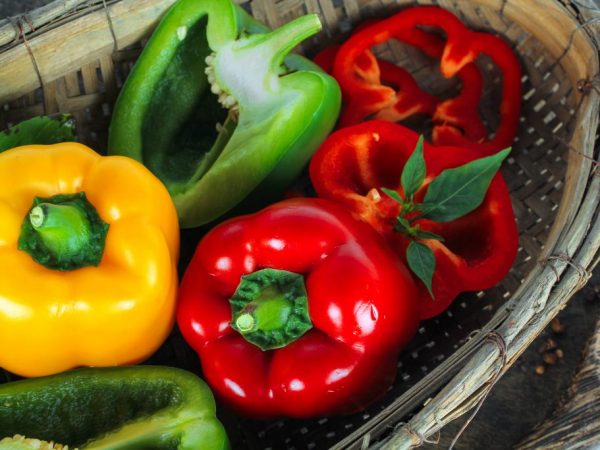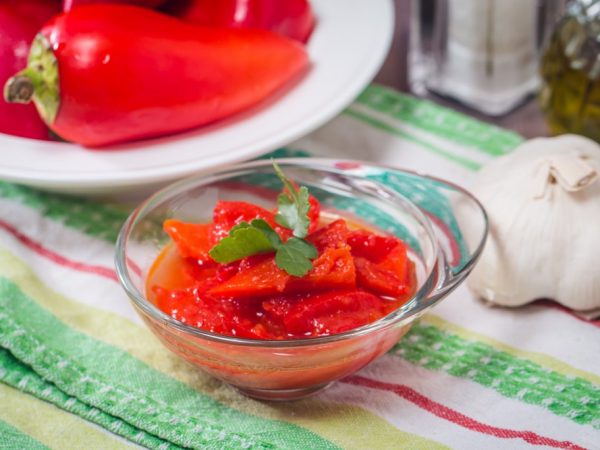Calorie content of various types of pepper
More than one vegetable grower grows bell peppers on the site. This overseas vegetable is eaten fresh, as well as pickled, boiled, stewed, fried, stuffed. Consider how much the product can be consumed and what is the calorie content of the pepper.

Calorie content of various types of pepper
Pepper composition
There are many varieties of vegetables in a variety of shapes and flavors. There are fruits of yellow, red, green, orange, brown, purple colors.
Bulgarian pepper is a hollow fruit made up of 90% water. This vegetable also contains:
- fiber;
- proteins, fats and carbohydrates;
- vitamins A, C, E, K, H, P, group B;
- nicotinic, folic, ascorbic acid;
- macronutrients: potassium, sodium, calcium, phosphorus, magnesium;
- trace elements: zinc, selenium, iodine, iron, manganese, chlorine, molybdenum, copper, chromium, sulfur, fluorine;
- antioxidants: quapsanthin (in red fruits), viloaxanthin (in yellow fruits), lutein (in green fruits), quercetin and luteolin.
In terms of vitamin C content, green fruits are inferior to colored relatives and are practically not suitable for culinary processing, since they begin to taste bitter. The amount of beta-carotene in red fruits is higher than that of its green relatives.
Beneficial features
To provide a daily dose of vitamins, it is advised to eat 1-2 pcs. bell pepper. The product is used for making salads and juices. The pulp is used to prepare cosmetic masks that saturate the skin with vitamins.
Pepper is useful for depression and stressful situations, memory problems and insomnia. Also, the vegetable lowers the level of glucose in the blood, so it must be consumed by patients with diabetes mellitus. It is effective for edema and dermatitis.
Due to the content of a large number of trace elements, it is indispensable for vitamin deficiency, anemia and dysfunction of the sweat and sebaceous glands. A wide range of vitamins helps to strengthen tooth enamel, bone tissue and hair follicles. It normalizes blood pressure, the digestive system, and increases appetite.
Calorie content of fresh vegetable
Bell pepper is a dietary product, about 25 kcal per 100 g. This means that those who are losing weight need not be afraid to eat it daily. Orange, yellow, red, green - these are the fruits of one shrub, the color of which directly depends on the degree of ripeness.
The number of calories in one bell pepper depends on the color, so it is better for those who are losing weight to give preference to a low-calorie green pod. It is slightly bitter and contains almost no sugar. Many people like to eat red and orange vegetables, but their calorie content is higher.
Ground pepper contains fewer kilocalories and trace elements than ordinary peppers.
- There are 26.8 kcal per 100 g of red bell pepper: 1.27 g of protein, 0 g of fat and 5.4 g of carbohydrates. It is recommended to use it to prevent cancer, atherosclerosis and vascular diseases, to restore the digestive system. Due to the high content of fiber, pectin, starch, red fruits are indispensable for people suffering from avitominosis, anemia, depression.The combination of vitamin E and ascorbic acid thins the blood and prevents blood clots. Daily consumption of red fruits cleanses the body of toxins and cholesterol, therefore, has a beneficial effect on the figure and health of a person.
- 100 g of yellow pepper contains 27.2 kcal, 1.31 g of protein, 0 g of fat, 5.28 g of carbohydrates, a large amount of carotene and ascorbic acid. The yellow fruit is rich in potassium, which means it is necessary for people with heart disease. It helps to strengthen nails, bones, as well as the walls of blood vessels, improves hair structure, and helps in the production of endorphins. Due to the absence of sucrose in the pulp, the product is recommended for diabetics. The yellow pepper is rich in antioxidants, therefore it is an excellent assistant in the preservation and regeneration of skin cells.
- Green pepper contains 33.2 kcal: 1.4 g of protein, 0 g of fat, 6.7 g of carbohydrates. The content of capsaicin helps lower blood pressure, improves appetite and pancreatic secretion. It is in green fruits that the amount of substances that can prevent cancer is higher than that of its colored counterparts. It contains fatty acids: omega-3, omega-6, oleic, palmitic, stearic and others, the combination of which rejuvenates skin cells and tones the body.
- Chili pepper contains minerals, vitamins, capsaicin, the presence of which determines its pungency. The vegetable is dietary, contains 40 kcal: carbohydrates - 7.2 g, fats - 0.3 g, proteins - 1.3 g. Moderate consumption of it improves bowel function and gastric juice secretion, eliminates constipation and speeds up metabolism. Ideal for people struggling with obesity. Eating hot peppers is useful for allergies and bronchial asthma.
Calorie content of processed pepper

The calorie content is influenced by the way the pepper is processed
Depending on the method of heat treatment of pepper, its calorie content changes.
There are 29 kcal per 100 g of stewed vegetable: 0.3 g of protein, 3.7 g of fat and 0 g of carbohydrates. The body easily assimilates these fats and does not store them at the waist.
100 g of lecho contains 32.6 kcal: 1.1 g of protein, 0.77 g of fat and 5.52 g of carbohydrates.
Gourmets prefer to eat a fried vegetable, however, it contains about 106 kcal per 100 g, therefore, this dish should not be overused. You can replace it with a baked vegetable if necessary. Its taste is no worse than fried, but there are fewer calories. For example, a snack consisting of baked peppers, balsamic vinegar and vegetable oil contains only 46 kcal, while grilled peppers contain 34 kcal. The lowest calorie boiled vegetable is 29 kcal.
Pickling is a harvesting method in which vegetables retain up to 80% of nutrients. So, for 100 g of homemade pickled product there are 25 kcal: proteins - 1.3 g, fats - 0.1 g and carbohydrates - 4.9 g.
White and black pepper
Along with the Bulgarian vegetable, white and black peppers are widespread. It is used in peas or in ground form for the preparation of fish and meat dishes, pates, salads.
100 g of white ground pepper contains approximately 296 kcal, as well as phosphorus, potassium, zinc, sodium, calcium, iron, B vitamins and minerals.
The spice has an antiseptic, antihelminthic and astringent antifungal effect, improves the digestion process and removes toxins. To achieve the effect, it is enough to eat 1-2 peas a day.
Pepper has a beneficial effect on the nervous and cardiovascular systems, improves immunity, freshens breath and is used to make anti-inflammatory and warming ointments.
100 g of black ground pepper accounts for 251 kcal: proteins - 10.4 g, fats - 3.3 g, carbohydrates - 38.7 g. It contains 1-2% essential oils and 5-9% piperine alkaloid, which causes a bitter-pungent taste and specific aroma. Ground black pepper has a beneficial effect on blood circulation and digestion, normalizes metabolism.
Pepper diet
Fresh peppers are a great vegetable for weight watchers. Nutritionists advise replacing a sweet dessert with several slices at an afternoon snack. It is recommended to be eaten as an independent dish or a side dish. Losing weight should in no case use stewed or pickled peppers as a main dish, because a lot of oil and salt are used in its preparation.
There is a seven-day diet based on fresh bell peppers. During this time, the body is able to get rid of 3 to 5 kg. You can repeat the diet no earlier than a month later.
Contraindications
Despite the benefits, excessive consumption of fresh vegetables can cause colic, vomiting, and diarrhea. In this case, it is recommended to drink water for 6 hours and refrain from food. The sweet pod can burn the stomach lining if consumed as a main course on an empty stomach.
For people suffering from stomach or duodenal ulcers, chronic diseases of the kidneys, gallbladder, liver, as well as hemorrhoids, the use of this vegetable is contraindicated: bleeding may open.
Use in case of hypotension is undesirable: the product can cause migraines, vomiting and dizziness.
With gout, a vegetable is allowed to be consumed only at the initial stage of the disease.
The Bulgarian vegetable absorbs well carcinogens and pesticides, which have a detrimental effect on the human body. To avoid meeting such fruits, you must grow them yourself.
Bulgarian pepper is a truly dietary product. It contains few calories both raw and processed, so it must be included in the diet of those who are losing weight.


